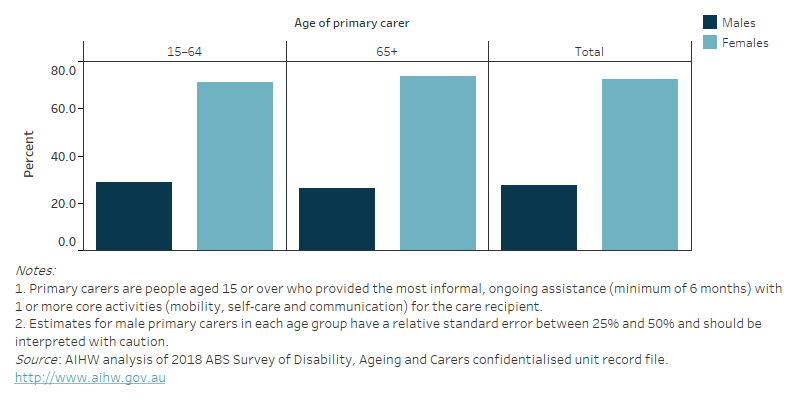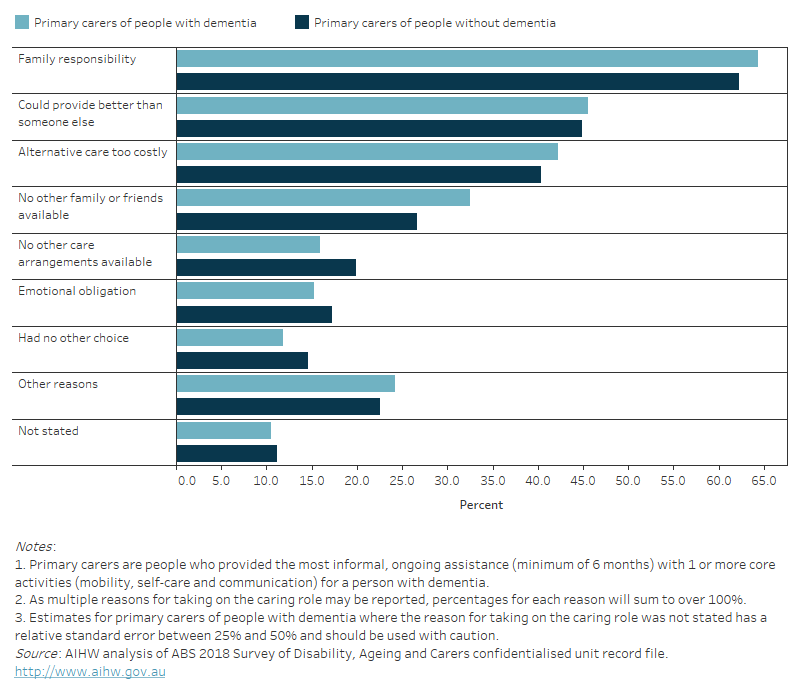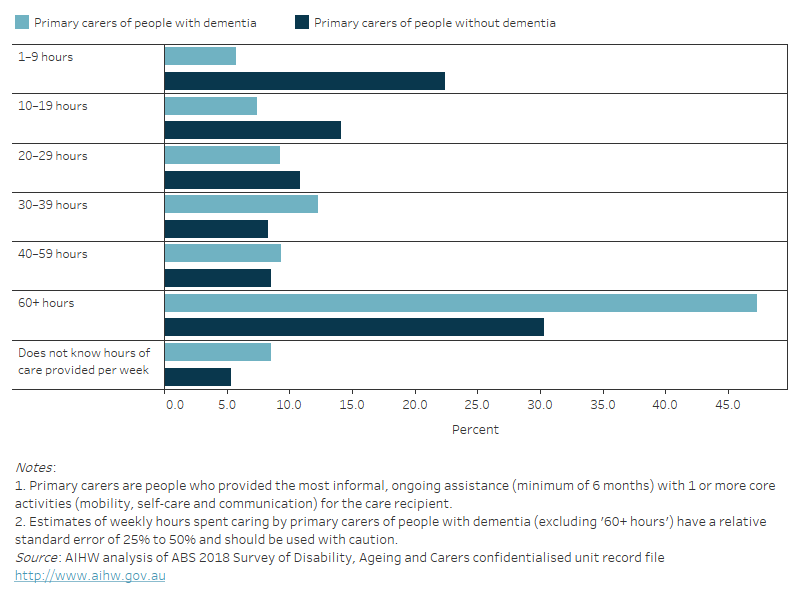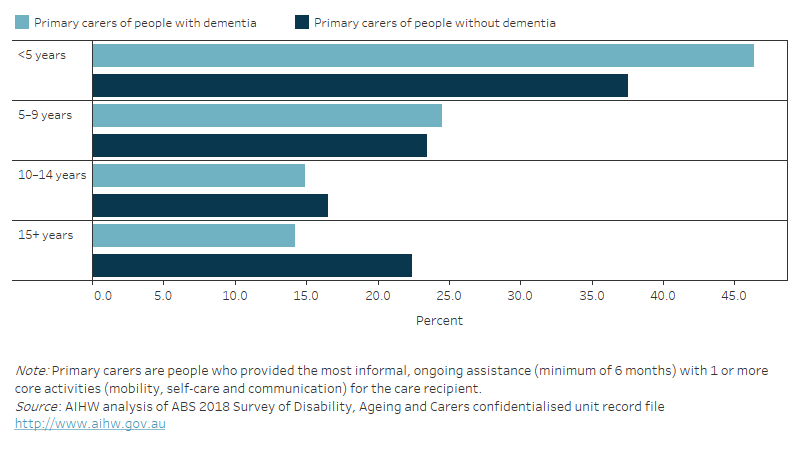Carers of people with dementia
Key statistics




Carers play an important role in providing care for family members and friends with illnesses or disabilities and are pivotal in Australia's aged care, health-care, disability and social systems. Carers assist and support with a range of daily activities such as self-care, transport, meal preparation and household chores, as well as provide overall supervision and manage behavioural or medical problems. For carers of people with dementia, the type of support and assistance needed will vary depending on individual circumstances but the level of care required will increase as the dementia progresses.
This page provides information on the number of carers of people with dementia in Australia as estimated by the Australian Institute of Health and Welfare (AIHW), and information from the Australian Bureau of Statistics (ABS) Survey of Disability, Ageing and Carers (SDAC) 2018 on:
For key carer definitions used in this report see Box 6.1.
For more information on how carer characteristics differ in people from non-English speaking countries, see Dementia among people from culturally and linguistically diverse (CALD) backgrounds. For information on carers among First Nations people, see First Nations-specific health and aged care programs and caring roles among First Nations people.
Box 6.1: Key definitions used in this report
This report relies on a number of definitions from the ABS Survey of Disability, Ageing and Carers (SDAC) 2018. The definition of a ‘carer’ in the SDAC varies depending on the level of care provided:
- Carer refers to people who provide any informal assistance (help or supervision) to people with disability or older people (aged 65 and over). The assistance must be ongoing, or likely to be ongoing, for at least 6 months. It excludes people who provide formal assistance (on a regular paid basis, usually associated with an organisation). A carer is either a primary carer or other carer.
- Primary carer refers to carers aged 15 or over who provided the most informal, ongoing assistance with one or more core activity tasks (mobility, self-care or communication) for a person with disability. The assistance must be ongoing, or likely to be ongoing, for at least 6 months. For this report, all primary carers lived in the same household as their care recipient.
- Other carer refers to carers who: are aged under 15 – provide informal assistance with one or more core activity tasks but do not provide the most assistance or provide assistance with non-core activities only.
While information on carers in this report refers to people who provide assistance to those living in the community, it is important to note that there are people who provide significant care to family and friends with dementia living in residential aged care facilities.
How many carers of people with dementia are there in Australia?
The number of carers of people with dementia in Australia is unclear. Based on the available data, the AIHW estimates that in 2023, there were at least 140,900 informal carers of people with dementia who live in the community. However, this is likely an underestimate of the true number of carers of people with dementia in Australia. Expand the following section, Knowledge gaps on carers of people with dementia in Australia, for details on data gaps for carers of people with dementia in Australia and how the total number of carers in Australia was estimated for this report.
There are significant gaps and inconsistencies in national data on carers of people with dementia in Australia.
The ABS Survey of Disability, Ageing and Carers (SDAC) 2018 provides the most up-to-date national information on carers of people with dementia. However, the SDAC is limited in its ability to provide a comprehensive picture as the information collected is restricted to co-resident carers (primary and otherwise) only for people with dementia and it is difficult to adequately identify population groups of interest (such as First Nations people and people of culturally and linguistically diverse backgrounds). Further, the SDAC will likely under identify the number of people with dementia (particularly people with mild dementia living in the community). Refer to Box 5.1 for more information on limitations of reporting on people with dementia from the SDAC.
As a result of these gaps, it is challenging to present a comprehensive national picture on; how many Australians provide care to people with dementia, what the important support mechanisms for carers are, what their unmet needs are, and how the prevalence of carers and their needs may change in the future. Without this information, the ability to plan and make informed decisions on the magnitude and type of support services needed for carers of people with dementia in the future is limited.
Estimating the number of carers of people with dementia
The AIHW estimates that in 2023, there were at least 140,900 carers of people with dementia in Australia who live in the community. The minimum estimate was derived by applying the rate of carers of people with dementia from the SDAC 2018 to the estimated residential population aged 15 and over for the year 2023. However, the SDAC will be an underestimate as only carers who lived in the same household as the care recipient with dementia (co-resident carer) were included. In addition, the SDAC also underestimates the number of people with dementia living in the community.
Primary carers of people with dementia
This section presents information from the SDAC on primary carers of people with dementia who live in the same household as the care recipient.
According to the SDAC, in 2018:
- 126,700 people were providing informal care to people with dementia – over half were primary carers (55%, or 70,200 people).
- Almost 3 in 4 primary carers of people with dementia were females (72%).
- This proportion was similar among carers aged under 65 (71% were female) and carers aged 65 and over (74% were female) (Figure 6.1).
- Half of primary carers were caring for their partner with dementia (50%).
- The remainder were mostly caring for their parent with dementia (41%) (Table S6.4).
Figure 6.1: Primary carers of people with dementia in 2018: percentage by sex in each age group
Figure 6.1 is a bar graph showing the percentage of primary carers of people with dementia according to the ABS Survey of Disability, Ageing and Carers in 2018 by age and sex of the primary carer. Almost three-quarters of primary carers of people with dementia were female, and this pattern was consistent across primary carer age groups.

Motivation to take on the caring role
Based on the SDAC, in 2018 the most common reasons for primary carers of people with dementia to take on the caring role was:
- family responsibility (64%)
- they could provide better care than someone else (46%)
- alternative care is too costly (42%)
- no other family or friends were available (32%) (Figure 6.2).
For most of the common reasons for taking on the caring role, proportions were similar for primary carers of people with dementia compared with primary carers of people without dementia.
Figure 6.2: Primary carers of people with dementia and people without dementia in 2018: percentage by reason for taking on the caring role
Figure 6.2 is a bar graph showing the percentage of primary carers of people with dementia and primary carers of people without dementia in 2018 by their reason for taking on the caring role. Almost two-thirds of primary carers of people with dementia reported that they took on the caring role because it was a family responsibility. Other common reasons included that they could provide better care than someone else, alternative care was too costly and that they had no other family or friends available to help. There were no substantial differences between primary carers of people with and without dementia.

Time spent in the caring role
As dementia progresses, people with the condition require increasing levels of care across all aspects of daily living. This is reflected by the amount of time primary carers of people with dementia spend providing care.
The vast majority (93%) of primary carers of people with dementia provided continuous rather than episodic care, and almost half of primary carers of people with dementia were providing an average of 60 or more hours of care per week (47%) (Figure 6.3). In contrast, the caring intensity was overall lower for primary carers of people without dementia, with 78% providing continuous care and 30% providing on average 60 or more hours of care per week.
Figure 6.3: Primary carers of people with dementia and people without dementia in 2018: percentage by average weekly hours spent caring
Figure 6.3 is a bar graph showing the percentage of primary carers of people with dementia and primary carers of people without dementia in 2018 by average weekly hours spent caring. Just under half of primary carers of people with dementia were providing an average of 60 or more hours of care per week compared with less than one-third of primary carers of people without dementia.

Primary carers of people with dementia had generally spent a shorter period of time providing care than primary carers of people without dementia. Among primary carers of people with dementia:
- 46% had been providing care for less than 5 years. There was no statistical difference compared with primary carers of people without dementia (38%).
- 14% had been providing care for 15 years or more. This was less than for carers of people without dementia (22%) (Figure 6.4).
These differences may be due to the generally late age of onset of dementia, transition into residential aged care for people with dementia when extensive support is required and people with dementia living for a shorter number of years with the diagnosed condition compared to other care recipients without dementia.
Figure 6.4: Primary carers of people with dementia and people without dementia in 2018: percentage by years spent caring
Figure 6.4 is a bar graph showing the percentage of primary carers of people with dementia and primary carers of people without dementia in 2018 by the number of years spent caring. Primary carers of people with dementia had generally spent a shorter period of time providing care than primary carers of people without dementia.

ABS (Australian Bureau of Statistics) (2019) Disability, Ageing and Carers, Australia: Summary of Findings, 2018– Explanatory notes, ABS, Australian Government, accessed 10 July 2023.


